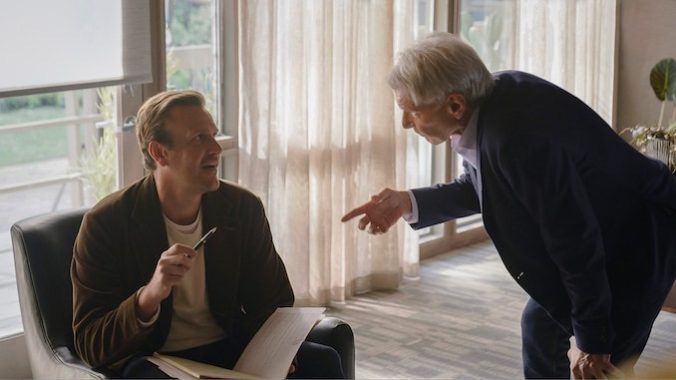Apple TV+’s Shrinking Introduces a Hilarious Psychological Vigilante We Didn’t Know We Needed
Photo Courtesy of Apple TV+
For avid fans of the sitcoms Scrubs, Cougar Town, and most recently, Ted Lasso, Bill Lawrence’s name will be familiar. The producer-writer-director has crafted some of the funniest (and most lovable) shows seen on television. And his latest series, the 10-part Apple TV+ comedy Shrinking (co-created with Ted Lasso fan-favorite Brett Goldstein and comedy veteran Jason Segel), has every chance of blossoming into another crowd-pleasing success: it’s unapologetically witty, charmingly heartfelt, and features a set of quirky characters that are irresistibly likable.
The plot follows Jimmy (Jason Segel), a therapist and a single father in Pasadena, CA, who’s been grieving his late wife for over a year. He’s tried several coping mechanisms (including the self-destructing routes: booze, drugs, and prostitutes) to deal with the loss, but nothing seems to be helping. He just can’t get back on track and be the supporting dad he should be to his teenage daughter, Alice (Lukita Maxwell). His apathetic mood has leaked into his professional life, turning him into a passive counselor without much progression to show for when it comes to his patients. Then one day, Jimmy snaps and loses his cool over one of his patients, Grace—who’s been seeing him for two years—and tells her if she doesn’t leave her misogynistic asshole boyfriend, he won’t be her therapist anymore.
His outburst is unprofessional, a complete breach of ethics, and it works like a charm. Grace agrees, ditches the guy, and stays with her sister in Vancouver. Worked up by the sudden rush, Jimmy shares his frustration with his two colleagues/friends, Gaby (Jessica Williams) and Paul (Harrison Ford), hoping for some advice. Paul (who’s clearly a mentor to him) lectures Jimmy by saying that while he understands “compassion fatigue,” as professionals, they should never judge any patient let alone threaten them. “We aren’t psychological vigilantes,” he says. Jimmy gets the message, loud and clear. But after receiving a call from Grace explaining that she took his advice and feels great about it, he simply can’t help himself. From that moment, he tells each one of his patients what he thinks their problems are and what they should do to get out of their own way. While the early feedback seems promising, we suspect the inevitable backlash will come sooner or later. And in fact, his reckless behavior will affect both his personal life and the troubled relationship with his daughter, especially after he befriends a new patient, Sean (Luke Tennie), and invites him to stay at his house when Sean’s parents kick him out.
What Shrinking does right from the start is be upfront about every character’s emotional baggage. Jimmy grieves, Gaby has marital issues, and Paul struggles to open up about his Parkinson’s diagnosis. They might be shrinks, but they’re also human beings dealing with the same personal problems as any of us (which they often ignore just like their patients do). There’s a lot of heavy stuff in Shrinking—grief, divorce, loneliness, depression, even PTSD—yet the show tackles them with such ease it feels hopeful and upbeat rather than grim and depressing. Taking advantage of the “humor comes from pain” approach, the writing deftly employs emotional situations to set up punchlines. Take the innocent scene where Jimmy asks Gaby about her husband’s drinking problem while holding a glass of Scotch, then quickly puts it down once he realizes the irony of the situation. The show is self-conscious to a fault, filled with many similar hilarious moments, but how could it not be when its protagonists are all therapists?
Through Jimmy’s irresponsible behavior, the series constantly shows the breaking of professional boundaries that might be risky, yet also can be laugh-inducing. Taking an ex-soldier suffering from war trauma to an MMA session, forcing a misanthrope to small-talk with a barista he hates, and surprising a patient on his date to tell him to stop lying and open up are just a few examples of Jimmy’s crazy new method. Yet they aren’t only comical but also effective—at least in the short term—in moving the plot forward dynamically.
-

-

-

-

-

-

-

-

-

-

-

-

-

-

-

-

-

-

-

-

-

-

-

-

-

-

-

-

-

-

-

-

-

-

-

-

-

-

-

-








































